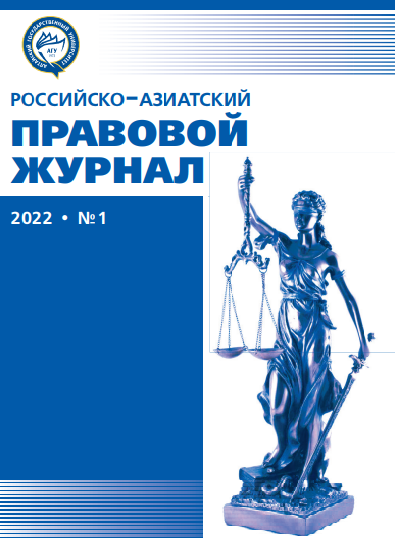PRINCIPLES OF LEGAL RESPONSIBILITY: NEW CRITERIA OF CLASSIFICATION AND SUBORDINATION
УДК 340.111 ББК 67.02
Abstract
In the article the idea of the necessity of ranking the principles of legal responsibility is conducted. Inthe process of practical use of the principles of legal responsibility between them collisions are inevitable. Inthis case, there should not be a compromise between legality and justice — a decision must be made in favorof justice. A collision between justice and charity must be removed in favor of charity. Any conflicts betweenthe principles of legal responsibility are hierarchical. Thus, any conflicts of principles of legal responsibilityshould be overcome in favor of the principle of higher order.
Downloads
References
Витрук Н.В. Общая теория юридической ответственности. М., 2008
Мироненко М.Б. Принципы юридической ответственности. Тольятти, 2001.
Макуев Р.Х. правонарушения и юридическая ответственность. Орел, 1998.
Russian-Asian Law Journal is a golden publisher, as we allow self-archiving, but most importantly we are fully transparent about your rights.
Authors may present and discuss their findings ahead of publication: at scientific conferences, on preprint servers, in public databases, and in blogs, wikis, tweets, and other informal communication channels.
Russian-Asian Law Journal allows authors to deposit manuscripts (currently under review or those for intended submission) in non-commercial, pre-print servers such as ArXiv.
Authors who publish with this journal agree to the following terms:
- Authors retain copyright and grant the journal right of first publication with the work simultaneously licensed under a Creative Commons Attribution License that allows others to share the work with an acknowledgement of the work's authorship and initial publication in this journal.
- Authors are able to enter into separate, additional contractual arrangements for the non-exclusive distribution of the journal's published version of the work (e.g., post it to an institutional repository or publish it in a book), with an acknowledgement of its initial publication in this journal.
- Authors are permitted and encouraged to post their work online (e.g., in institutional repositories or on their website) prior to and during the submission process, as it can lead to productive exchanges, as well as earlier and greater citation of published work (See The Effect of Open Access).








